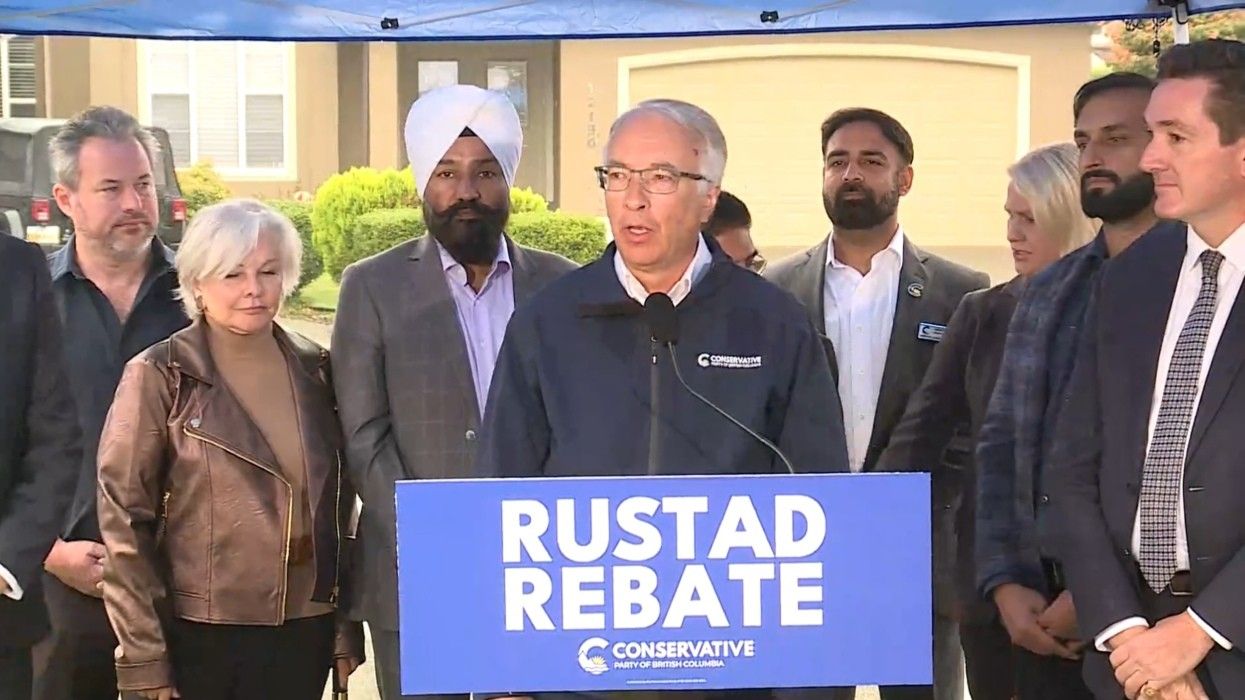After the election campaign period officially kicked off on Saturday, September 21, the Conservative Party of BC is wasting no time, making a big promise to voters on Monday morning to address housing affordability.
The proposed BC Rent and Mortgage Rebate — colloquially being called the "Rustad Rebate," after Conservative Leader John Rustad — would exempt housing costs from provincial income taxes beginning at a maximum of $1,500 a month starting January 2026. The maximum, income-tested, rebate would then be increased by $500 per year in subsequent years, until the rebate ultimately reaches a maximum of up to $3,000 per month.
At a press conference on Monday, Rustad attributed this stepped implementation to the "fiscal irresponsibility of David Eby and his government."
The BC Rent and Mortgage Rebate would apply to both renters and homeowners, and would be administered as a tax credit worth 5.06% of eligible housing costs, equivalent to the rate of BC's base tax bracket, said the Conservatives in a press release.
The Conservatives are calling it the "largest tax cut for renters and homeowners in BC history" and are positioning the promise — its first concrete proposal related to housing — in contrast to the renters' rebate that was introduced by the NDP-led government.
"In 2017, David Eby and the NDP promised a $400 rent rebate for all renters, regardless of income. As usual, they broke that promise not once, but twice," said Rustad. "Not only did they fail to deliver for five consecutive budgets, but when they finally introduced it in 2023, it was so severely income-tested that the average family in Vancouver can't qualify. The NDP's scheme barely covers 1% of the annual rent for a one-bedroom apartment in Vancouver. It simply isn't good enough. Families and individuals are being driven out of our cities because they can't afford to live here anymore."
The Conservatives have been running on a platform with a heavy emphasis on fiscal responsibility, and said that the proposed Rent and Mortgage Rebate would be "fair and fiscally responsible."
They did not outline where the funding for the rebate program would come from, however, but noted in the press release that the impact on Budget 2026 would not exceed $900 million. At the press conference, Rustad then said the program will ultimately cost around $3.5 billion, if applied to the approximately two million homes in British Columbia.
BC 2024 Election
From a different perspective, the proposed "Rustad Rebate" aligns with the Conservatives' approach towards addressing affordability, which is to reduce payments for British Columbians.
One of the core planks of the party's platform has been to scrap the existing Carbon Tax — "axe the tax," in the party's words. The Carbon Tax, the first such tax in North America, was introduced by the BC Liberals (now known as BC United) in 2008 and applies to the purchase and use of fossil fuels. As of April 2024, the tax is now at $80 per tonne of carbon dioxide equivalent emissions (tCO2e), which amounts to approximately $0.1761 per litre of gasoline.
With the election campaign period now officially underway, the discourse will hopefully shift more towards policy than the drama that has dominated the election season for far, after Kevin Falcon, the Leader of BC United, the Official Opposition, abruptly ended his party's campaign on August 28 and threw the party's support to the Conservatives — a move to avoid splitting the centre-right vote. Rustad was formerly a member of BC United, before being removed by Falcon two years ago.
According to polling conducted by Leger last week, the BC NDP currently holds a very slight 44% to 42% lead over the Conservatives. Party Leader and Premier David Eby, however, currently holds a significant lead when it comes to approval ratings, with the Leger poll giving Eby a 47% approval rating, well ahead of Rustad's 34% — likely a reflection of Rustad's past denial of climate change and conspiratorial thinking regarding 5G, among other controversies. Rustad's approval rating, according to the poll, is currently below that of Green Party Leader Sonia Furstenau, whose approval rating is at 35%.
The provincial general election will be held on Saturday, October 19.





















